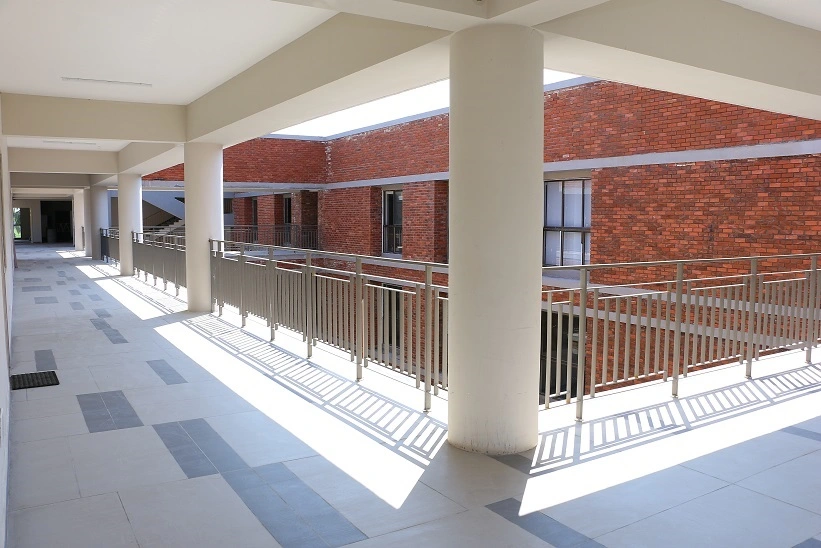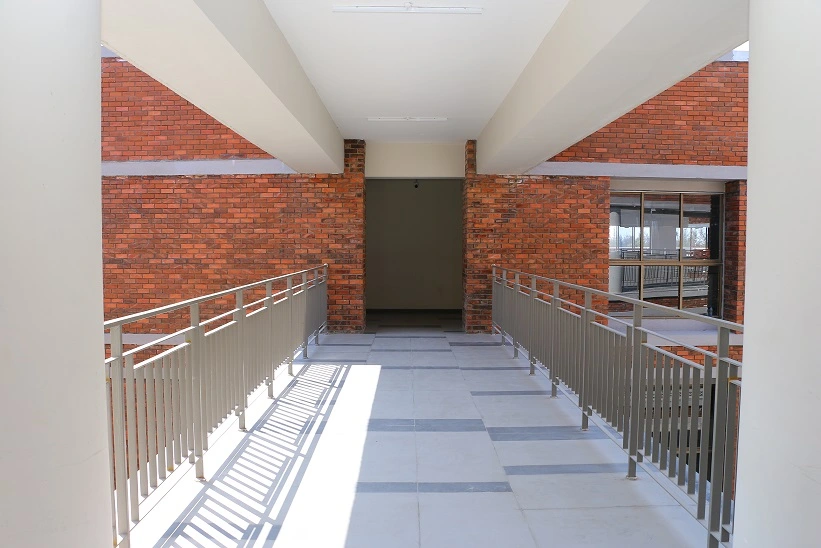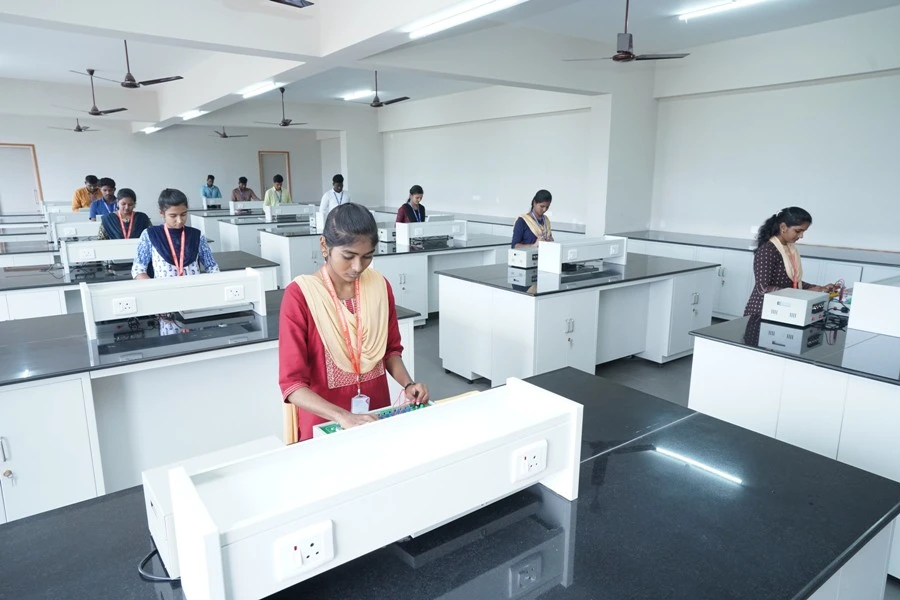B.Sc. Renal Dialysis Technology
- Hands-on Training
- Faculty with International Experience
- Advanced Curriculum
- Upto 100% Scholarship based on merit

About the Course
The B.Sc. in Renal Dialysis Technology is a three-year undergraduate programme that prepares students to play a vital role in the care of patients with kidney failure. Focused on the operation and management of dialysis machines and patient monitoring, this course equips you with both theoretical knowledge and hands-on training in hemodialysis. At Takshashila University, students are trained to deliver safe, efficient, and empathetic dialysis care under the supervision of nephrologists and nursing staff—while mastering the use of high-end renal therapy equipment.
Course Curriculum

Year 1
Introduces core subjects in anatomy, physiology, and basic principles of dialysis. Students gain an understanding of renal function and disease progression.
Key Subjects: Human Anatomy & Physiology, Biochemistry, Pathology, Introduction to Dialysis Technology, Basics of Renal Diseases, Patient Care Techniques.
Year 2
Focuses on dialysis equipment, water treatment systems, prescription interpretation, and patient preparation. Students start practicing basic procedures in clinical labs.
Key Subjects: Hemodialysis Procedures, Extracorporeal Circuits, Dialyzer Setup & Maintenance, Pharmacology, Infection Control, Clinical Practicum I.
Year 3
Covers emergency interventions, troubleshooting, documentation, ethical practices, and includes an intensive internship in a dialysis centre or hospital.
Key Subjects: Advanced Dialysis Technology, Patient Monitoring & Emergency Management, Dialysis Equipment Maintenance, Clinical Internship, Professional Ethics.
Programme Outcomes (POEs)
Graduates of the B.Sc. in Renal Dialysis Technology programme will be equipped with the following competencies:
Technical Expertise in Hemodialysis
Operate dialysis machines, manage dialyzer circuits, and monitor patients during treatment.
Clinical Readiness
Prepare patients for dialysis, administer local anaesthesia, and take vital signs with confidence.
Equipment Proficiency
Understand the mechanics, maintenance, and reprocessing of dialysis equipment and water treatment systems.
Patient-Centric Skills
Deliver safe, ethical, and compassionate care during high-stress medical scenarios.
Compliance & Safety
Maintain hygiene standards and follow national/international dialysis regulations and protocols.
Documentation & Communication
Accurately document treatment details and communicate with the healthcare team and patients.
Programme Specific Outcomes (PSOs)
The B.Sc. Renal Dialysis Technology programme supports the following learning outcomes:
PO1: Deep Understanding of Renal Physiology & Disorders
Acquire a scientific understanding of kidney function and chronic kidney diseases.
PO2: Mastery in Dialysis Procedures
Learn to carry out complete dialysis sessions including setup, monitoring, and post-care.
PO3: Hands-On Operation of Equipment
Become skilled in handling dialysis machines, water purification units, and safety mechanisms.
PO4: Emergency Preparedness
Train to recognize and respond to complications such as hypotension, cramping, or clotting.
PO5: Ethical & Empathetic Practice
Ensure patient dignity and emotional well-being while maintaining professional conduct.
PO6: Industry-Ready & Globally Competitive
Build a skill set aligned with global dialysis care standards, opening doors to domestic and international careers.
Career Scope
The demand for dialysis technologists is rapidly rising in India and abroad due to the increasing incidence of chronic kidney disease. Graduates can find employment in hospitals, kidney care centres, nephrology clinics, and dialysis units.
Dialysis Technician
- Role: Perform routine dialysis procedures, machine handling, and patient care in clinical setups.
- Salary Range: ₹3,00,000 to ₹5,50,000 per annum.
Clinical Coordinator – Dialysis Unit
- Role: Manage dialysis schedules, staff coordination, and maintain patient care quality.
- Salary Range: ₹4,50,000 to ₹7,00,000 per annum.
Nephrology Lab Technician
- Role: Conduct laboratory tests related to renal function and support nephrologists in diagnostics.
- Salary Range: ₹3,50,000 to ₹6,00,000 per annum.
Dialysis Therapist
- Role: Provide therapy-based support to patients undergoing long-term dialysis treatments.
- Salary Range: ₹4,00,000 to ₹6,50,000 per annum.
Medical Device Operator (Dialysis Machines)
- Role: Work in the biomedical or medical devices industry managing renal equipment installations and servicing.
- Salary Range: ₹4,00,000 to ₹8,00,000 per annum.
Academician / Lecturer
- Role: Teach renal physiology, dialysis care, and clinical skills in allied health institutions.
- Salary Range: ₹3,50,000 to ₹6,00,000 per annum.
Why TAKSHASHILA?

Dedicated Dialysis Training Facility
Gain real-time exposure in state-of-the-art labs with functional dialysis machines and simulated patient environments.
Clinical Tie-Ups with Hospitals
Practical training through internships at reputed hospitals and kidney care centres.
Experienced Clinical Faculty
Learn from nephrologists, nurses, and technologists with years of hands-on experience.
Global Career Readiness
Curriculum aligned with international renal care standards to support global job placements.
Patient-Centric Teaching Approach
Emphasis on both technical skills and compassionate care delivery.

- Academic Qualification: 10+2 pass with Physics, Chemistry, and Biology as core subjects.
- Minimum Marks: Minimum 50% aggregate in the qualifying examination.
- Interviews: Admission may involve merit screening or a personal interview.

Academic Scholarship
S.No | Percentage of marks | Scholarship Amount per year (Rs) |
1 | 60% – 69% | ₹10,000 |
2 | 70% – 79% | ₹15,000 |
3 | 80% – 89% | ₹25,000 |
4 | 90% and above | ₹35,000 |
Sports Scholarship
S.No | Participation Level | Concession in Tuition Fee (%) |
1 | District | 25% |
2 | State | 50% |
3 | National | 75% |
4 | International | 100% |
Life at Takshashila University / Experience Beyond the Classroom at Takshashila University
The B.Sc. Renal Dialysis Technology programme is designed to deliver a clinical, collaborative, and compassionate learning experience.
What you can look forward to

Hands-On Machine Training
Learn using the same high-end dialysis equipment found in leading hospitals.

Internships with Impact
Practice in real patient-care environments and work with experienced nephrologists and nurses.

Skills Beyond the Lab
Participate in workshops on patient counselling, medical ethics, and emergency response.

Career Launchpad
Get job-ready with campus placement support and certification guidance for national and international roles.
Spread over 150 acres
At Takshashila University, you will have ample opportunities to hone your skills in real-world healthcare settings, utilising state-of-the-art medical facilities and simulation labs on our 150-acre campus.
Want to be a life-saving link in the chain of kidney care?
Frequently Asked Questions (FAQs)
What is the duration of the B.Sc. Renal Dialysis Technology course?
It’s a 3-year undergraduate programme divided into six semesters.
What qualifications are needed to apply?
You should have completed 10+2 with PCB subjects and a minimum of 50% aggregate.
Do students get practical training?
Yes, extensive hands-on training and internships are provided in hospital dialysis units.
What career options are available after this course?
Graduates can work as Dialysis Technicians, Clinical Coordinators, or pursue further studies in nephrology or allied health.









